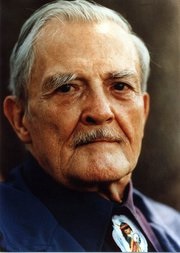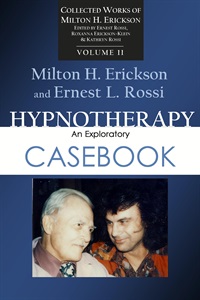Hypnotherapy: An Exploratory Casebook: Collected Works Volume 11 Paperbound
- Average Rating:
- Not yet rated
- Topic Areas:
- Collected Works | Hypnotherapy | Milton Erickson
- Categories:
- The Collected Works
- Author:
- Milton H. Erickson MD | Ernest Rossi, PhD
- Copyright:
-
2013
- Publisher:
- The Milton H. Erickson Foundation Press
- License:
- Never Expires.
Description
In my original Foreword to this volume I expressed the opinion that, with Milton Erickson, Ernest Rossi “has done the best job to date in clarifying Erickson’s ideas on the nature of hypnosis and hypnotic therapy, on techniques of hypnotic induction, on ways of inducing therapeutic change and of validating this change.” Many books have been written about Erickson’s approaches to therapy in the 33 years that have passed since this book was published, yet I will still stand with that opinion.
On reading or re-reading this book and others, edited by or co-written by Ernest Rossi we cannot fail to be impressed by Rossi's new ideas, about the Utilization Approach and the dvelopment of new frames of reference, for example. These ideas have become so accepted in different approaches to psychotherapy that they seem to have been obvious and to have existed forever. We are especially struck by Erickson's incredible, sometimes exquisite use of works. As Paul Watzlawick has noted Erickson "heals with words."
Contents
- The Utilization Approach to Hypnotherapy
- The Indirect Forms of Suggestion
- The Utilization Approach: Trance Induction and Suggestion
- Posthypnotic Suggestion
- The Problem of Pain and Comfort
- Symptom Resolution
- Memory Revivication
- Emotional Coping
- Facilitating Potentials: Transforming Identity
- Creating Identity: Beyond Utilization Theory
Credits
Author

Milton H. Erickson MD Related Seminars and Products
Milton H. Erickson, MD, was an American psychiatrist who specialized in medical hypnosis and family therapy. He was founding president of the American Society for Clinical Hypnosis and noted for his approach to the unconscious mind as creative and solution-generating.
Dr. Erickson was plagued with enormous physical handicaps for most of his life. At age 17, he contracted polio and was so severely paralyzed that doctors believed he would die. While recovering in bed, almost entirely lame and unable to speak, he became strongly aware of the significance of nonverbal communication – body language, tone of voice, and the way that these nonverbal expressions often directly contradicted the verbal ones. He also began to have “body memories” of the muscular activity of his own body. By concentrating on these memories, he slowly began to regain control of parts of his body to the point where he was eventually able to talk and use his arms again. His doctor recommended exercising his upper body only so Milton Erickson planned a 1,000 miles canoe trip to build up the strength to attend college. His adventure was challenging, and although he still did not have full use of his legs at the end, he was able to walk with a cane.
The Ericksonian approach departs from traditional hypnosis in a variety of ways. While the process of hypnosis has customarily been conceptualized as a matter of the therapist issuing standardized instructions to a passive patient, Ericksonian hypnosis stresses the importance of the interactive therapeutic relationship and purposeful engagement of the inner resources and experiential life of the subject. Dr. Erickson revolutionized the practice of hypnotherapy by coalescing numerous original concepts and patterns of communication into the field.
The novel psychotherapeutic strategies which Dr. Erickson employed in his treatment of individuals, couples, and families derived from his hypnotic orientation. Although he was known as the world’s leading hypnotherapist, Dr. Erickson used formal hypnosis in only one-fifth of his cases in clinical practice.
Dr. Erickson effected a fundamental shift in modern psychotherapy. Many elements of the Ericksonian perspective which were once considered extreme are now incorporated into the mainstream of contemporary practice.

Ernest Rossi, PhD Related Seminars and Products
Ernest L. Rossi, PhD, is an internationally renowned therapist, teacher and pioneer in the psychobiology of mind-body healing. The author of more than 24 professional books, Dr. Rossi worked with Milton Erickson for eight years and co-authored three classic volumes on therapeutic hypnosis with him. Rossi has also edited four volumes of Erickson's Collected Papers and four volumes of Erickson's Seminars, Workshops and Lectures. He has been conducting research in the psychosocial genomics of ultradian rhythms and their relation to mind-body healing and psychotherapy for over three decades.


